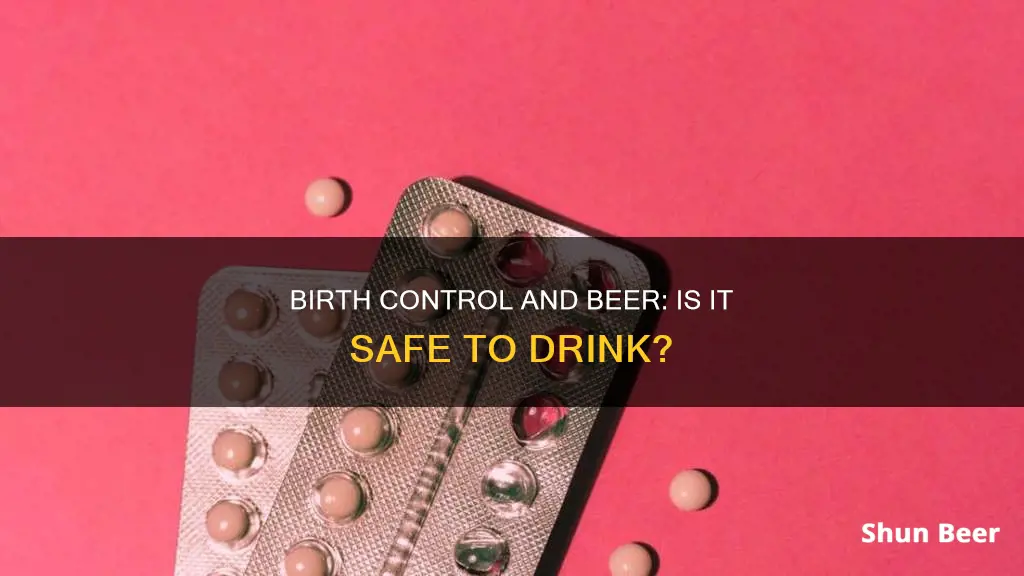
Drinking alcohol while on birth control is a common concern, especially as both are prevalent among women. Alcohol does not directly interfere with the effectiveness of birth control methods such as the pill, IUDs, implants, injections, patches, or condoms. However, there are several alcohol-related risks that can indirectly affect the efficacy of birth control. Firstly, alcohol intoxication can impair judgment and increase the likelihood of contraceptive failure, unsafe sex, or forgetting to take the pill or use protection. Secondly, vomiting from excessive drinking within a couple of hours of taking the birth control pill may hinder drug absorption, reducing its effectiveness. Lastly, heavy drinking while on birth control may increase the risk of developing certain medical complications, such as blood clots. Therefore, it is crucial to drink responsibly, set reminders, and consider using backup contraception methods when consuming alcohol while on birth control.
| Characteristics | Values |
|---|---|
| Alcohol's effect on birth control effectiveness | Alcohol does not affect the overall effectiveness of birth control. |
| Alcohol's effect on behaviour and judgement | Alcohol consumption can increase the likelihood of contraceptive failure by impairing judgement and increasing the likelihood of risky sexual behaviour. |
| Alcohol's effect on vomiting | Vomiting within 2-3 hours of taking the pill may reduce its effectiveness. |
| Alcohol's effect on blood alcohol levels | Birth control may affect your body water distribution, changing the rate at which alcohol is eliminated, leading to higher blood alcohol levels and increased intoxication. |
| Alcohol's effect on risk of getting sick | Alcohol consumption can increase the risk of getting sick, and if you vomit after taking your pill, your body might not absorb it. |
| Alcohol's effect on long-term health | The long-term health effects of drinking alcohol can make you more susceptible to serious complications from oral contraceptives. |
What You'll Learn
- Alcohol does not directly affect birth control effectiveness
- Alcohol can cause you to forget to take your birth control pill
- Vomiting after drinking may affect the absorption of your birth control pill
- Alcohol may increase your risk of blood clots if you are on the pill
- Alcohol may increase your risk of risky sexual behaviour

Alcohol does not directly affect birth control effectiveness
However, alcohol consumption can affect your behavior and judgment, increasing the likelihood of contraceptive failure. If you are drunk or hungover, you may forget to take your birth control pill or change your vaginal ring. Alcohol may also make you more likely to engage in risky sexual behavior, such as unprotected sex or sex with multiple partners, which can increase your risk of unintended pregnancy and sexually transmitted infections (STIs).
Additionally, if you vomit within two hours of taking your birth control pill, the effectiveness of the pill may be compromised as your body may not have had enough time to absorb it fully. This is because it takes at least two hours for the pill to be absorbed by your body. If you vomit after this two-hour window, you are likely still protected.
If you take birth control pills, it is important to be aware that alcohol may affect your body's ability to process alcohol. This is because the liver has to metabolize both the alcohol and the hormones in the birth control pills. As a result, alcohol may stay in your body for longer, and its effects may be more intense and last longer. Therefore, it is recommended to drink in moderation and to plan ahead if you know you will be drinking alcohol while taking birth control.
Viagra and Beer: A Safe Mix?
You may want to see also

Alcohol can cause you to forget to take your birth control pill
Alcohol does not directly affect the effectiveness of birth control. However, it can increase the risk of contraceptive failure by impairing judgment and affecting behaviour. If you drink heavily or become intoxicated, you may forget to take your birth control pill on time or at all. This risk is heightened if you start drinking before the time you usually take your pill. Additionally, if you drink heavily the night before, you may sleep through the time you normally take your pill.
If you are taking the progestin-only pill (POP), which must be taken within a three-hour time frame every day, alcohol may cause you to miss this window.
To avoid missing a dose due to drinking, you can set reminders on your phone, take your pill in the middle of the day when you are less likely to be drinking, or switch to a longer-term birth control method that does not need to be taken daily, such as an IUD, implant, or vaginal ring.
Beer and Farxiga: What You Need to Know
You may want to see also

Vomiting after drinking may affect the absorption of your birth control pill
Vomiting after drinking alcohol may affect the absorption of your birth control pill. If you throw up within two hours of taking your birth control pill, your body might not have absorbed the pill, and its effectiveness may be compromised. This is because the hormones in the birth control pill need time to be absorbed into the bloodstream through the liver. If you vomit within this time frame, take another pill as soon as possible and use a backup method of contraception, such as a condom, until you can consult your healthcare provider.
It is important to note that alcohol does not directly affect the effectiveness of birth control methods, including emergency contraception. However, alcohol consumption can increase the risk of contraceptive failure by impairing judgment and increasing the likelihood of unsafe sex or forgetting to take the pill as directed. Additionally, drinking alcohol while taking birth control pills may lead to an increased risk of nausea and vomiting.
To reduce the risk of vomiting after drinking, it is recommended to drink in moderation, avoid drinking on an empty stomach, and follow general guidelines for alcohol consumption. It is also important to take your birth control pill at the same time every day and set reminders to ensure you don't miss a dose.
If you experience ongoing vomiting or diarrhea lasting more than 24 hours, your protection from pregnancy may be reduced. In this case, continue taking your birth control pills at the normal time each day, but also use a backup method of contraception until you recover. If you are frequently missing doses or experiencing side effects, consider discussing alternative contraceptive methods with your healthcare provider.
Beer and Theraflu: A Safe Mix?
You may want to see also

Alcohol may increase your risk of blood clots if you are on the pill
Alcohol may increase your risk of blood clots, especially if you are taking oral contraceptives. While alcohol does not affect the effectiveness of birth control, it can increase your risk of contraceptive failure. This is because drinking heavily or becoming intoxicated can cause you to forget to take your birth control pill on time or at all. Additionally, if you vomit within 2-3 hours of taking your pill, your body might not absorb it, increasing your chance of ovulation.
The combination of alcohol and oral contraceptives can further increase your risk of blood clots. Hormonal birth control, by itself, increases clotting factors in the blood by 170% while decreasing anticoagulant factors by 20%. Alcohol consumption can also affect your body's water distribution, changing the rate at which alcohol is eliminated from your system. This can lead to higher blood alcohol levels and increased intoxication. As such, you may become intoxicated more quickly and be at a higher risk of blood clots.
Furthermore, excessive alcohol consumption is associated with weight gain and a sedentary lifestyle, both of which contribute to an elevated risk of blood clots. Therefore, if you are taking oral contraceptives, it is important to drink in moderation and be aware of the potential risks associated with alcohol consumption.
Beer Drinking: Cold or Not?
You may want to see also

Alcohol may increase your risk of risky sexual behaviour
Alcohol consumption can increase the risk of risky sexual behaviour. This is true for both men and women, and is supported by a large body of research.
Alcohol can lead to risky sexual behaviour in a number of ways. Firstly, alcohol can cause individuals to forget to take their birth control pill, or use protection. Secondly, alcohol can lower inhibitions and impair judgement, leading to riskier sexual behaviour. This is supported by Alcohol Myopia Theory, which states that alcohol reduces cognitive capacity, causing people to focus on the most salient cues in their environment. In a sexual context, this means that people may be more likely to focus on sexual arousal, and less on the risks of STI transmission or unwanted pregnancy. This is especially true when strong instigatory cues are present, such as sexual arousal, and when inhibitory cues, such as the risk of STI transmission, are less obvious.
Research has shown that alcohol use is associated with a first sexual encounter at an early age, inconsistent condom use, and multiple sexual partners. This is true for both men and women, although there are some gender differences. For example, one study found that inconsistent condom use with a new partner was twice as high for women who often consumed alcohol in relation to sexual activity, although this association was not statistically significant.
The link between alcohol and risky sexual behaviour is complex and influenced by a range of factors, including social and situational factors, personality traits, and individual expectations about the effects of alcohol. Interventions to reduce alcohol-related risky sexual behaviour should target both male and female drinkers and emphasise the increased risk of unprotected sex with someone unknown.
Expired Beer: Is It Safe to Drink After Three Years?
You may want to see also
Frequently asked questions
Alcohol does not affect the overall effectiveness of birth control methods, including the pill and emergency contraception.
Alcohol consumption can increase the risk of contraceptive failure. Drinking heavily or becoming intoxicated may lead to missing a dose or forgetting to use protection. Vomiting within 2-3 hours of taking the pill may also reduce its effectiveness.
Birth control may affect your body's water distribution, leading to higher blood alcohol levels and increased intoxication. It may also slow down the rate at which your body processes alcohol.
The long-term health effects of alcohol consumption while on birth control may include an increased risk of serious complications, such as high blood pressure, heart disease, or depression and anxiety.







